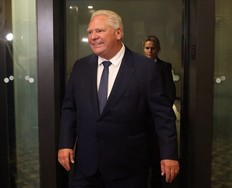OPINION: Voters should remember Canada has other problems beyond tariffs

Article content
Canadians will head to the polls on April 28 after Prime Minister Mark Carney called a snap federal election. As the candidates make their pitch to try and convince Canadians they’re best-suited to lead the country, U.S President Donald Trump’s tariffs will take centre stage. But, while the tariff issue is important, let’s not forget the other important issues Canadians face.
High Taxes: As many Canadians struggle to make ends meet, taxes remain the largest single expense. In 2023, the latest year of available data, the average Canadian family spent 43% of its income on taxes compared to 35.6% on food, shelter and clothing combined. High personal income tax rates also make it harder to attract and retain doctors, engineers and other high-skilled workers who contribute to the economy. Tax relief, which delivers savings for families across the income spectrum while improving Canada’s competitiveness on the world stage, is long overdue.
Government Debt: At the end of March, Canada’s total federal debt will reach a projected $2.2 trillion or $52,094 for every man, woman and child in Canada. The federal government expects to pay $53.7 billion in debt interest costs in the fiscal year 2024/25, diverting taxpayer dollars from programs, including health care and social services. The next federal government should rein in spending and stop racking up debt.
Red Tape: Smart regulation is necessary, but the Canadian economy is plagued by a costly and excessive regulatory burden imposed by governments. Regulatory compliance costs the economy approximately $12.2 billion annually and the average business dedicates an estimated 85 days towards compliance. The next federal government should cut undue red tape and make Canada an easier place to do business.
Housing Affordability: Canadians across the country are struggling with the cost of housing. Indeed, Canada has the largest gap between home prices and incomes among G7 countries and rents have spiked in recent years in many cities. In short, there’s not enough housing to meet the demand. The next federal government should avoid policies that stoke further demand while working with the provinces and municipalities to remove impediments to homebuilding across Canada.
Collapsing Business Investment: Business investment is necessary to equip workers with the tools, technology and training they need to be more productive, yet business investment has collapsed. Specifically, from 2014 to 2021, inflation-adjusted business investment per worker fell from $18,363 to $14,687. Declining investment has helped create Canada’s productivity crisis, which has led to a decline in Canadian living standards. Ottawa needs a new policy approach to address this crisis.
RECOMMENDED VIDEO
Declining Living Standards: According to Statistics Canada, inflation-adjusted per-person gross domestic product — a broad measure of living standards — dropped from the post-pandemic peak of $60,718 in mid-2022 to $58,951 by the end of 2024. The next government should swiftly reverse this trend by enacting meaningful policy reforms that will help promote prosperity. The status quo simply will not suffice.
Tariffs are a clear threat to the Canadian economy and should be discussed at length during this election. But we shouldn’t forget other important issues that arose long before Trump began this trade war and will continue to hurt Canadians if not addressed.
Jake Fuss and Grady Munro are fiscal policy analysts at the Fraser Institute











Postmedia is committed to maintaining a lively but civil forum for discussion. Please keep comments relevant and respectful. Comments may take up to an hour to appear on the site. You will receive an email if there is a reply to your comment, an update to a thread you follow or if a user you follow comments. Visit our Community Guidelines for more information.